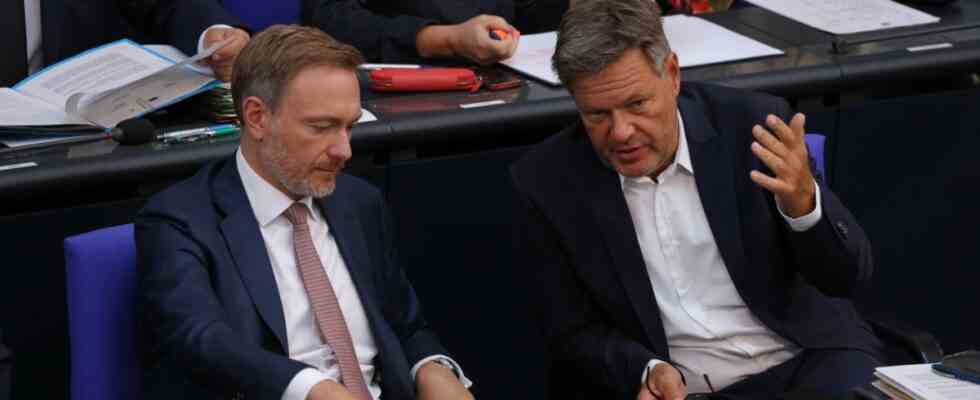The smug tone in the letters that the Federal Economics Minister and the Federal Finance Minister write to each other takes some getting used to. “Dear Mr. Colleague” it says in stilted style, although not only in Berlin many people know that Robert Habeck and Christian Lindner actually use the first-name terms. That’s how it starts. Now, however, both are formulating fundamental contradictions in an emphatically polite tone. Robert Habeck (Greens) wants compliance with the debt brake to be just one of several goals, and he indirectly calls for tax increases. Christian Lindner (FDP), on the other hand, strictly rejects tax increases and emphasizes that the goals in the coalition agreement are legally subordinate to compliance with the Basic Law, i.e. the debt brake. The only thing that is clear here is that the two are completely at odds.
As for the style, it’s terrible to take such a dispute out in the coalition. Chancellor Olaf Scholz is certainly not enthusiastic. But in terms of content, it is exactly right that the noise about money is now becoming public. Because it is high time that, in view of the many plans of the traffic light government, the crucial question for the future of the citizens should be addressed: who should pay for it?
It’s been blurred far too much lately. Most of the talk was about what you could do with money – and very little about where the money would come from. This is unpleasant, but crucial for the citizens.
The trend has been around for a long time. In recent years one could get the impression that money had changed its character. The period of negative interest led some to believe that debts were nothing for the state to burden itself with. You could even make some money with it. So why not borrow more now to finance the projects of the future – and pay back less later? The debt brake, it was up for grabs for some. Then she was exposed several times. For good reasons: After all, Germany does not experience a pandemic every day, nor does it experience a war and an energy crisis. In both cases it made sense for the state to step in with large programs to prevent the economy from collapsing. Incidentally, the debt brake also provides for exceptions for precisely such situations.
But all of this gave the impression that the money will come from somewhere when you need it. If necessary, through household magic with debts in special pots close to the edge of legality.
This impression naturally suited the government very well. Above all, she has made a lot of plans that could cost a lot of money. Just a few examples: The FDP would like to introduce a share pension. The Greens want to use a lot of money to push the complete restructuring of the economy towards CO₂ neutrality. In addition, the government committed itself to investing many billions in defense.
So there is something good about the curious pen friendship
Unfortunately, the world of money has changed completely in the past few months. The high inflation that Europe and America have been experiencing for a long time called the central banks into action. They raise interest rates to combat high prices. However, this also increases the interest rates that countries have to pay in order to get into debt. Lo and behold: money is money! Borrowing it costs something and can get more expensive.
The cheap money is passé. At the same time, the government’s ideas about what else should be financed have grown so blatantly that there is a tough conflict of goals: it must either tighten the debt brake or increase taxes or set clear priorities and cancel or postpone projects.
It is high time that this was discussed. And that the citizens have a say in it. It’s going to be painful either way. In this sense, the curious pen pal has something good.

